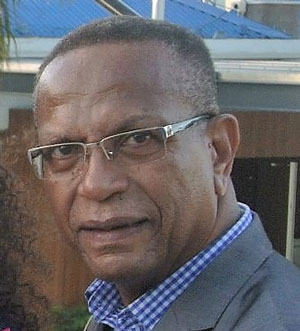 PHILIPSBURG:--- Recently, Parliament held a meeting to discuss the appointment of a quartermaster for the Integrity Chamber by the Dutch Government. Most Parliamentarians, however, overlooked the fact that the discussion had to be focused on the process, the procedure, the legality and the validity of said appointment. With the exception of MP Sarah Wescot-Williams, parliamentarians and members of government spoke more about the Integrity Chamber. It was also very sad to observe that half of the MPs present had absolutely nothing to say about the appointment neither about the Integrity Chamber.
PHILIPSBURG:--- Recently, Parliament held a meeting to discuss the appointment of a quartermaster for the Integrity Chamber by the Dutch Government. Most Parliamentarians, however, overlooked the fact that the discussion had to be focused on the process, the procedure, the legality and the validity of said appointment. With the exception of MP Sarah Wescot-Williams, parliamentarians and members of government spoke more about the Integrity Chamber. It was also very sad to observe that half of the MPs present had absolutely nothing to say about the appointment neither about the Integrity Chamber.
All the speakers practically agreed that breaches of integrity are common in Sint Maarten. And actually, the same can also be said of all countries. Each year, a list of countries is issued by Transparency International (TI), showing how each country ranks and scores as far as corruption is concerned. In 2016, TI investigated 176 countries and not one of them came close to a perfect score. The highest score of 90 percent went to Denmark and Zealand. The Netherlands scored 83 percent and ranked as the 8th least corrupt country. During the parliamentary debates, it was said that the Dutch wanted to impose an Integrity Chamber on Sint Maarten, while they do not even have one themselves. Although the Netherlands may not have an Integrity Chamber, it has two institutions that tackle integrity issues in government. Being a member of the GRECO (Group of States against Corruption), the Dutch government submits annual integrity reports to this European Union Entity. Furthermore, each municipality in the Netherlands has a B.I. (Bureau Integriteit or Integrity Office) which falls under BING (Bureau Integriteit Nederlandse Gemeenten). Albeit, even if the Netherlands did not have these two bodies, this does not justify Sint Maarten not having one!
An Integrity Chamber is considered the watch dog in a country that guards against all integrity breaches. Currently, the highest integrity body in Sint Maarten, is our Parliament, which has done a bad job at dealing with integrity issues, since its inception in 2010. Unfortunately, Parliament, in many instances during the past six years, succumbed to numerous integrity breaches itself. On October 22nd 2014, Parliament passed a motion, instructing Government to establish a committee to review the findings of three integrity reports and to come up with a budget and a timeline. It is two years later and Parliament has heard nothing yet from this committee. Conversely, Parliament has also neglected, to follow up on the instructions given to government, two years ago. Furthermore, in 2015, Parliament established an Ad Hoc Committee of Integrity which tried to establish a code of conduct for parliamentarians. Nothing came out of this exercise, because our parliamentarians did not want to be subjected to any rules. Article 64 of the Constitution gives our parliament a very strong integrity tool which is, the right to carry out an in-depth investigation into wrong-doing in parliament and in government and if need be, parliament can ultimately submit its findings to the Public Prosecutor, according to article 80 of the Rules of Order of Parliament. Regrettably, during the last six years, Parliament has never made use of this right of inquiry.
Indeed, Parliament itself, has several instruments at its disposal which can be used to effect greater integrity. Yet, Parliament has never made use of these instruments to promote integrity. Hence, we can only conclude that Parliament is either not willing or not capable of “fixing we”, to use the expression of the Prime Minister. This means then, that there is certainly a need to establish another body that is specifically charged with integrity issues. If countries, regionally and internationally, that have oversight bodies, which we call High Councils of State, still see the need to establish integrity commissions, then there must be something that an integrity commission can do that the other oversight bodies are unable to do. It is worth mentioning here that most CARICOM countries have established integrity commissions and that since June 2015, these commissions have formed the Association of Integrity Commissions and Anti-Corruption Bodies in the Commonwealth Caribbean (AICACBCC).
Since Sint Maarten has to totally revamp its Integrity Ordinance that was rejected by the Constitutional Court, SMCP proposes that the new entity be called the Integrity Commission, in keeping with the term used by countries in the Caribbean. We also recommend that the Sint Maarten Integrity Commission seeks membership to the (AICACBCC). The goal of the Integrity Commission is not to lock up people, even though this could be a result of its investigation, but to be the watch dog and to keep an eye on both the legislative and the executive branches of government. In addition, to uncovering corruption and exposing integrity breaches, Integrity Commissions regionally, as well as internationally, have also an educational component to their scope of duties. They provide education and training to civil servants and government officials and they also seek to develop an integrity awareness among all citizens and to reach out to all educational institutions. Given the above information about contemporary Integrity Commissions, SMCP encourages government and parliament to take the Constitutional Court’s advice and develop an integrity commission similar to the ones in the region. SMCP believes that there is certainly a need for an Integrity Commission on Sint Maarten and the sooner the better!
Wycliffe Smith
Leader of the Sint Maarten Christian Party









